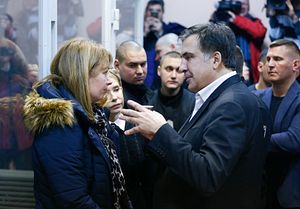After nearly a decade of leading Georgia (most notably during the 2008 war against Russia), by 2013, Mikheil Saakashvili’s political career appeared to be over. His United National Movement had lost both the parliament and the presidency to the Georgian Dream coalition, which had campaigned for rapprochement with Russia. Then, in 2014, the new government charged Saakashvili in absentia with “exceeding official powers.” Although tenuous, these allegations prevented Saakashvili’s return to Georgia.
In May 2015, in order to accept Ukrainian President Petro Poroshenko’s offer to serve as the governor of Odessa, Saakashvili renounced his Georgian citizenship. Saakashvili’s reformist vision soon put him on a collision course with Poroshenko, an oligarch, whose incentive to change the status quo is minimal. Saakashvili resigned in November 2016, citing his former friend’s “betrayal” of the ideals (of the 2014 revolution) he was elected to defend.
In July 2017, in an attempt to undermine Saakashvili’s new party, the Movement of New Forces, Poroshenko revoked Saakashvili’s naturalization. Rather than demoralizing Saakashvili’s anti-corruption crusade, Poroshenko inadvertently encouraged it.
In September 2017, despite being stateless, Saakashvili returned to Ukraine. He and fellow activists (many of whom are veterans of the ongoing war with Russian-backed separatists in the east) set up dozens of tents adjacent to the Ukrainian parliament building. This encampment has been the nucleus of large protests against the Poroshenko government, peaceful and violent alike.
On December 5, Ukrainian authorities arrested Saakashvili, but were forced to release him during a dramatic standoff with his supporters. Three days later, Saakashvili was recaptured. Although Saakashvili remains formally uncharged, prosecutors accuse him of being financially linked to a “fugitive businessman” with ties to Viktor Yanukovych, the ousted Ukrainian president, who now resides in Russia.
On December 11, a judge dismissed the state’s petition to extend Saakashvili’s detention. Several prominent opposition figures were at Saakashvili’s side during this eight-hour hearing, including former Prime Minister Yulia Tymoshenko — the main threat to Poroshenko’s reelection in 2019.
Despite his public silence, Chinese President Xi Jinping must be monitoring this episode with trepidation, given his country’s significant stakes in the region.
In November 2017, the Chinese government held highly-publicized forums in both Ukraine and Georgia to promote its Belt and Road Initiative (BRI). In Kiev, a “slew of agreements” were signed to reinforce the “strategic partnership” between China and Ukraine. In Tbilisi, the ratification of the Georgia-China Free Trade Agreement (GCFTA) was announced.
Georgia already has free trade pacts with the EU, Russia, and Turkey — as well as preferential market access to the United States, Canada, and Japan. Accordingly, as noted by Joseph Larson of the Georgian Politics Institute, “There is ample potential for Georgia to become a logistics hub linking China to the EU and beyond.” For these reasons, the GCFTA, which takes effect on January 1, 2018, represents a major victory for Xi. However, Xi did not anticipate that the Saakashvili sideshow would escalate into an international incident with the potential to hinder his global ambitions.
The situation is salvageable, though, if China exercises a strategy similar to the ones it currently uses to remain relatively neutral in the inter-Korean, Iran-Saudi, and Israel-Palestine conflicts — while economically engaging with all sides.
To this end, Xi could encourage Poroshenko to suspend his investigation of Saakashvili and reinstate his rival’s citizenship. Xi could also persuade Giorgi Margvelashvili (the current Georgian president) to drop the pending charges against Saakashvili — or at least convey his extradition requests less vocally. Poroshenko and Margvelashvili would likely assent to Xi’s requests, given the extent of Chinese investment in their countries.
The results of Xi’s maneuvers would be twofold. First, if the persecution of Saakashvili subsides in both Ukraine and Georgia, he can no longer claim to be a political martyr in either nation. In turn, the intensity of Saakashvili’s movements would diminish — thereby strengthening both the Poroshenko and Margvelashvili governments, which Xi’s administration has been working closely with since the BRI’s inception. Secondly, if, in the future, Saakashvili, his parties, or his allies come to power in Ukraine or Georgia, their disposition toward China would be favorable, given Xi’s prior intercession on Saakashvili’s behalf.
While the United States and EU express passive concern about the Saakashvili saga, and Russia “revels” in the chaos, China can step up as an active mediator. If successful, China will not only have protected its interests in Ukraine and Georgia, but it also will have demonstrated its diplomatic acumen to the world.
Philip Dubow is a graduate of the United Nations Interregional Crime and Justice Research Institute in Italy. He lived in China, and visited Ukraine and Georgia.

































